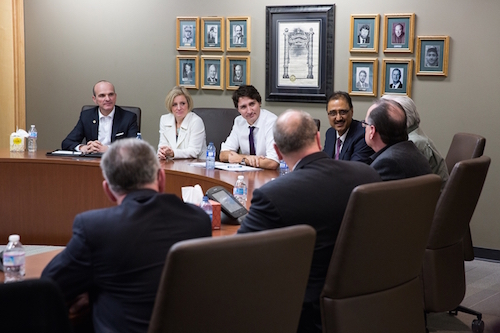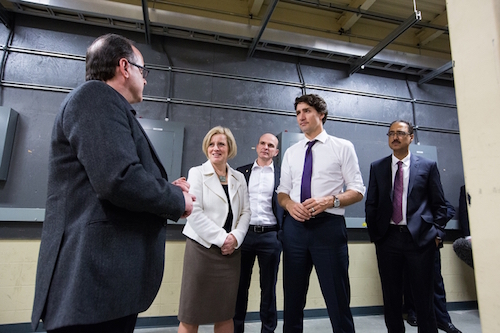Edmonton, Alberta, Local 424 Business Manager Kevin Levy was honored to host Prime Minister Justin Trudeau earlier this month. He now wants to ensure the visit pays off for his membership, which is feeling the effects of the economic downturn in western Canada.
Trudeau toured 424’s training facility on Feb. 1 along with Alberta Premier Rachel Notley and Minister of Infrastructure Amarjeet Sohi. Trudeau and Motley met earlier in the day, just the second time a prime minister and Alberta premier met during the provincial legislative session.
“He understands the importance of Alberta, the economy there, and getting people back to work,” said Matt Wayland, First District political action and media strategist. “That [visiting 424] is a big statement.”
It was a recognition by the newly-elected prime minister of Alberta’s economic difficulties due to the collapse of the oil sands-fueled energy boom.
Oil prices have plunged, dropping to less than CA$30 per barrel. Unemployment has skyrocketed. Statistics Canada reports Alberta lost nearly 20,000 jobs, the most in a calendar year since 1982.

|
| Canadian Prime Minister Justin Trudeau speaks with leaders from Alberta’s trade unions during a meeting at Edmonton Local 424 on Feb. 1.
|
Some analysts say the number of full-time jobs lost is closer to 35,000, with many of those displaced workers now working at lower-paying or part-time jobs. The province’s unemployment rate at the end of 2015 was 7.4 percent, up from 4.6 percent at the same time during the previous year.
Local 424 has about 8,500 members. Approximately 1,200 of them currently are out of work, Levy said. Two years ago, just before the price of oil started falling in September 2014, there was such a demand that 4,000 IBEW members from outside Local 424 traveled into the province for jobs.
Levy said the only time things were worse in his 35-year IBEW career was during a recession from the mid-1980s to the mid-1990s. Jack Fullerton, an inside wireman and Local 424 member since 1975, remembers that as a difficult time as well, but there was a bit of solace because some workers left for jobs in Ontario, which was doing well at the time.
That option isn’t as easily available today, Fullerton said.
“We have a lot people up here that have never experienced this situation before because of the long boom we had in the price of oil,” Levy said. “It’s the first time they’ve come to their union hall and we’re not able to get them any work. It’s been devastating to our families.”
The combination of the economic downturn and a push by the provincial government towards renewable energy has forced unions to change training and job opportunities. Local 424 is no different, Levy said.
Trades leaders support the Energy East project – which would connect a pipeline from Alberta to markets along Canada’s East Coast – but recognize that construction work in the oil sands will continue to dwindle during the next few years, he said.
Current projects will wind down and few, if any, new ones will start because the price of oil is so low. Enform, the safety organization for Canada’s oil and gas industry, estimates construction jobs at oil sands sites will decrease 84 percent by 2020. Workers will have look more at maintenance and operations jobs at those facilities if they want to stay in the industry.
“We have an obligation to our members to chase work wherever it’s available,” Levy said.

|
| Edmonton, Alberta, Local 424 Business Manager Kevin Levy welcomes Canadian Prime Minister Justin Trudeau, second from right, to the local’s training facility on Feb. 1. Accompanying Trudeau are Alberta Premier Rachel Notley, Parliament member Randy Boissonnault and Infrastructure Minister Amarjeet Sohi.
|
The provincial government announced a plan late last year that called for 30 percent of Alberta’s electricity to come from renewable sources by 2030. Levy said he and other IBEW leaders were expecting that and have invested heavily in solar training for members and apprentices.
Fullerton isn’t working at the moment, but he turns 65 in October and is contemplating retirement. He said workers will have to be more flexible than in the past. The days of relying on the oil sands are over.
Local 424 workers also were involved in the construction of the Shell Canada’s Quest Project, which captures carbon dioxide produced at Shell’s facility in Scotford, Alberta, and permanently stores it.
“We partner with our contractors and scour the community and tell businesses to let us know when a new technology is coming out,” Levy said. “When it’s ready to be deployed in the field, we’re ready and trained and we can strongly get at it.”
Trudeau and Notley – who both took office within the last year -- understand the problems working families face and are helping to find solutions, Levy said. That wasn’t the case under their predecessors.
“Unlike the right-wing government we just turfed, where the only solution was to lower corporate taxes and believe in the whole trickle-down theory, both of the [provincial and federal] governments are telling us they understand Alberta is hurting and are offering plans on what to do about it,” Levy said.
Trudeau took over as prime minister after the Liberal Party won the majority of Parliamentary seats in national elections in October, ending nearly 10 years of Conservative control. Notley is the leader of the Alberta New Democratic Party, which won a majority in the provincial elections in May 2015, ending 44 years of conservative Tory rule. Her provincial seat is in Edmonton and Local 424 has been a longtime supporter, Levy said.
Trudeau pledged CA$704 million in federal money towards infrastructure improvements in the province, but what most impressed Levy and others is that he and his cabinet are listening to suggestions from trade union leaders on where the money should best be spent.
Levy and Wayland said they understand there is a need to repair bridges and roads, but they also urged Trudeau to also push the federal government to invest in large-scale projects like schools and hospitals.
“What the IBEW can do is point to areas where they can put the money to work immediately for projects that are ready to go,” Wayland said. “Not only are you putting people to work, but you’re driving social change.”
The prime minister also heard suggestions on how to improve the Employee Insurance system, which provides assistance to workers who recently lost their jobs.
Levy emphasized said that any federal aid, while significant, is a short-term measure. Alberta’s economic downturn is estimated to last between three and five years, he said. It likely will be longer than that before the construction sector at the oil sands facilities recovers.
Identifying opportunities in growing or changing industries remains key. So does a government that provides help to get through the through tough times while also implementing family-friendly policies for the future, he said.
“We had a good healthy discussion,” Levy said. “We made it very clear that it’s an open dialogue and we want to keep it going.”